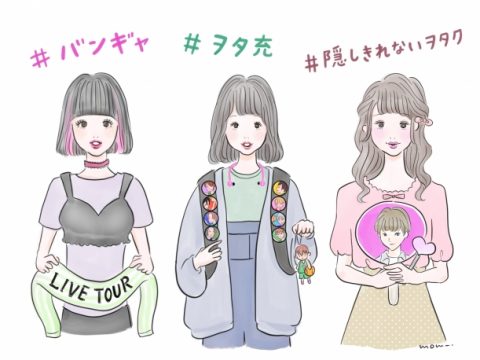Tokyo is consistently ranked as one of the most, if not the most, expensive city to live in. This unfortunately carries over to visiting as well, as vacations in Tokyo aren’t cheap. Compounded with the fact that otaku can be notoriously stingy (there are figures and video games to buy, after all), what’s a desperate otaku to do if you can’t quite afford lodging for your trip to Tokyo? Well, to be entirely honest, you should probably delay your trip and save up more money. Nobody likes getting a call in the middle of the night from their son/daughter/friend/relative asking to have money wired overseas. With that said, and with tongue planted firmly in cheek, we’d like to present to you some of the alternatives for cheap lodging in the world’s biggest city.
Note: the following article is presented for entertainment purposes only and shouldn’t be taken too seriously. Otaku USA is not responsible if you end up in jail, deported or dead thanks to your shoddy travel planning.
1. Sleeping in Public
The cheapest option is also the worst, but free is free. Nothing quite says “you shouldn’t be visiting this country” like sleeping on the streets. This method is particularly terrible because Tokyo tends to experience severe weather extremes. In the summer it will be absurdly humid, rainy and hot and you will smell like rancid gym socks almost immediately. In wintertime it’ll get cold enough you actually might die. The relative safety of Japan means that the only hassling you’re likely to get for trying this idiotic method is harassment from the cops, although theft still occurs even in seemingly crime-free Japan, so hopefully you’ve developed a comfortable method for sleeping on top of your luggage. Don’t let the passed out salarymen in train stations fool you: this is not a socially acceptable thing to do. Japanese people will view you as the weirdo you are if you try this.
Cost: None
Misery Index: Very High
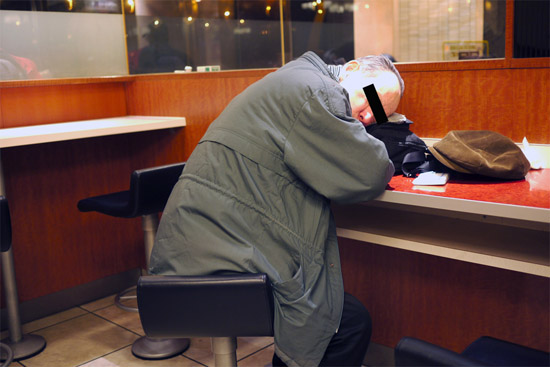
2. Sleeping in Restaurants
The classic last-resort of drunk masses who don’t feel like taking a taxi home after the last train or shelling out for proper lodging, this method takes advantage of the generosity of Japanese people. In many restaurants it’s unlikely you’ll be asked you to leave, but you might get shaken awake and told not to sleep. It’s not unusual to see people (locals, usually) practicing this method of cost-cutting, and places like the McDonalds in Kabukicho actually have signs that expressly forbid this behavior. We once spent a very long night with a friend passed out in a ramen shop in Roppongi and by the time morning rolled around, it was clear paying for the taxi would have been the better option.
Cost: Minimal. Buy something though, you jerk.
Misery Index: High.
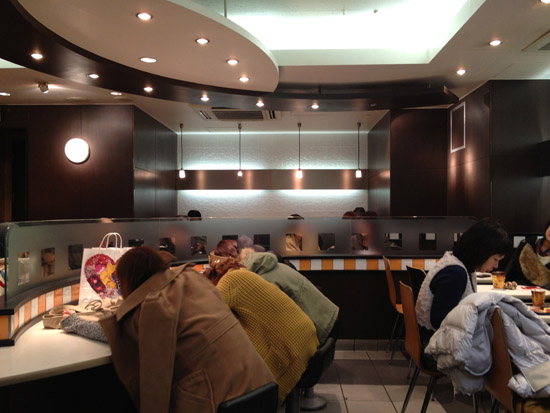
Most karaoke places will offer set deals for a few hours late at night, the idea being that you can while away the time until the trains start again singing Aerosmith songs with your mates. In actuality, there’s not a whole lot to stop you and a friend from just crashing out in the room. Add in the fact karaoke shops usually offer a selection of food and drink and TVs will automatically play videos, and it’s almost like room service with cable TV! Most karaoke rooms have soft couches, but they’re also inherently loud places, so you won’t get the most restful sleep. Hopefully you brought ear plugs.
Cost: Moderate.
Misery Index: Moderate.
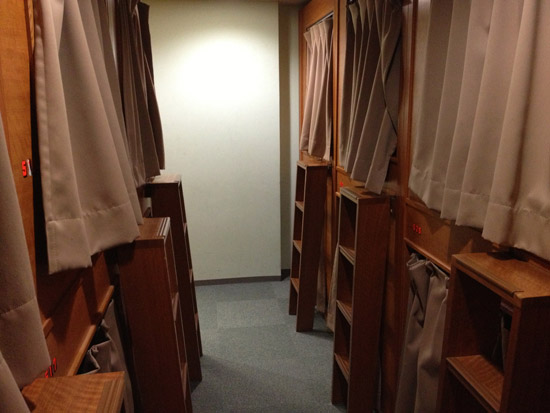
4. Capsule Hotels
Despite being mentioned in every article written about Japan throughout the 80s and 90s, capsule hotels are not quite the ubiquitous institution you might expect. Most major train stations will have capsule hotels nearby, but given that their target demographic is Japanese businessmen, they’re not always the easiest option for tourists, especially if you can’t speak Japanese. Tourist-friendly capsule hotels do exist, such as the Ace Inn Shinjuku which has plenty of English-speaking staff and caters to foreigners. Capsule hotels aren’t nearly as claustrophobic as you might expect, but they’re definitely not the roomiest option. The price (usually around 3,000yen/night) makes them a worthwhile option, assuming you’re okay with a few of the downsides like shared shower/bathroom facilities and the fact that you have to be out of the hotel every day by late morning.
Given the opportunity, you should try them out; they’re a lot of fun, not as cramped as you’d think and if you try one of the “real” capsule hotels you’ll be able to surround yourself with salarymen and experience a side of Japanese culture rarely seen. All will have showers, some will even have washing machines. Typically they will also offer food, although co-ed travel groups might be out of luck as most capsule hotels are strictly for dudes (Ace Inn welcomes both sexes, however). So do your research and try them out at least once.
Cost: Moderate
Misery Index: Low
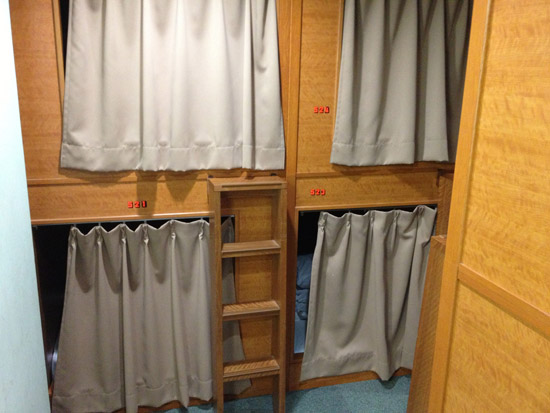
5. Internet Cafes
Internet cafes (often called mangakissa– “manga cafes”) offer “night packs” of 3-6 hours for a set price, usually between 1,000 and 1,500 yen. You’ll usually get your own mini-cubicle with a chair and computer, and various amenities depending on the location. A self-serve drink bar (unlimited soda, juice and coffee) is pretty standard. Some places don’t have chairs (which is actually better for sleeping, as you can curl up on the floor), some have very uncomfortable chairs, some keep the lights bright all night long; basically, there’s a lot variation and ultimately your comfort will depend on where you stay. Many Internet cafes will have showers, which is great because, let’s face it, you may stink. You’ll also have a large selection of manga to read and many will have a PS2 in each cubicle, if you feel like playing video games you could just play at home. As an added bonus, you may get to overhear people in neighboring cubicles watching porn or couples trying to get it on because they’re too cheap for a love hotel!
Cost: Low
Misery Index: Moderate to low

Bonus Option: Love Hotels
Thanks to the traditions of multiple generations living under the same roof, thin walls and a healthy sex trade, Japan’s love hotel industry thrives. The core business of love hotels revolves around people looking to rent a love hotel for just an hour or two, but after peak hours most will offer night packs that allow you to stay until morning for a reduced rate. The result is a considerably reduced cost that might actually be worthwhile if you’re traveling as a couple. More than two people might pose a problem, but being persistent can pay off, just be sure to say “no” to the creeper in front of the hotel who offers to pay for half “just to watch.” The upside of staying at a love hotel is big, comfortable beds, nice bathrooms and being able to brag to your friends back home about how you stayed at a love hotel. The downside is that you won’t be able to stay there very long, and there’s none of the amenities that real hotels offer (like providing a place to keep your bags during the day). Most major train stations will have a cluster of love hotels, so at the very least you’ll have plenty of options.
Cost: High
Misery Index: Low
The bottom line is that there are cheap options to stay in Tokyo, but you’ll need to do your research and think outside the box if you really want to save money, and being able to speak some Japanese will always help. More often than not, these extreme options aren’t really worth it – you’ll end up uncomfortable and grumpy and in the end your trip might not be quite as incredible as you had hoped. Tokyo is the kind of city where a little more money to spend can improve your enjoyment considerably, so keep that in mind when budgeting. If you’re forced to cut corners because of cost, delaying your visit and saving more money will always be the be better option.


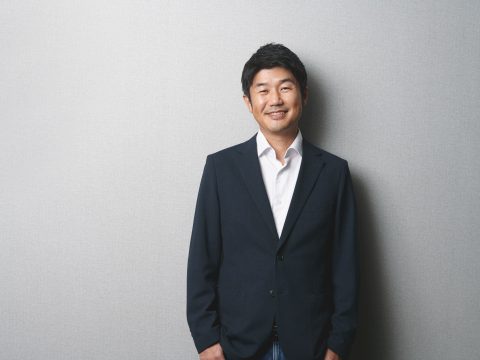


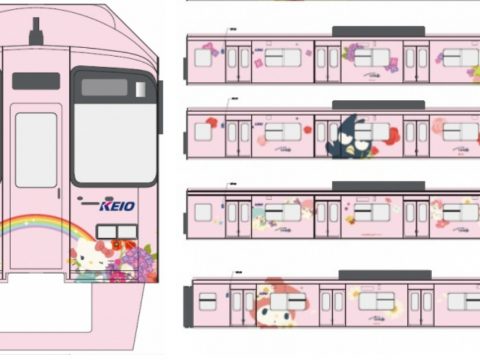
![Doc Big in Japan Offers A Guide on How (or How Not) to Get Famous in Japan [Review] Doc Big in Japan Offers A Guide on How (or How Not) to Get Famous in Japan [Review]](https://otakuusamagazine.com/wp-content/uploads/2018/07/biginjapan01-480x360.jpg)
